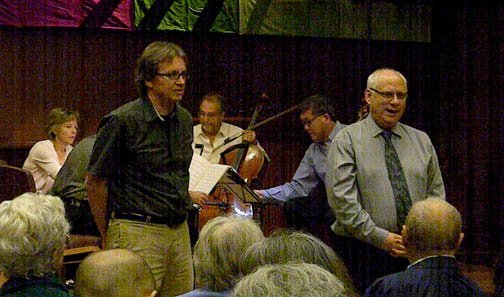In the early 20th century, with the film industry not yet out of its infancy, composers for the silver screen drew from concert music and opera to light their way as they charted new modes of expression. Things have come full circle since those days, as the latest Gernot Wolfgang chamber work proved. His String Theory for string quartet – a commission from Pacific Serenades, which performed the piece on Sunday at Pasadena’s Neighborhood Church – owes as much to composers from mid-20th century Hollywood as it does to some of that era’s classical music icons.
The work’s four compact movements was a bubbling cauldron of Honegger, Bartók, and the Bernard Herrmann of “Psycho” – all of it fused together by Wolfgang’s quirky voice.
Equally eclectic were the diverse titles and inspirations of each of String Theory’s movements. The Bartók of the Fifth and Sixth String Quartets was never far from the snap pizzicato spangled opening movement, named after the Hungarian composer. The inner movements, dubbed “Cartwheels’ and “Northern Lights,” teemed respectively with frenetic movement and eerie spectral sonorities.” Nashville,” which served as the piece’s rollicking finale, was according to the composer, rooted in his love of the eponymous television series. Yet there was a whiff of the Grand Ole Opry in the fiddle-like configurations that drove the music, albeit of a kind of country music reimagined, perhaps, by Ernst Krenek.
Bracketing the Wolfgang piece were quartets by Franz Josef Haydn and Bedrich Smetana, both enjoying readings of deep sensitivity and warmth.
Especially revealing was the Pacific Serenades quartet’s rendering of the Haydn quartet, the B minor one from his Opus 64 set. “Papa Haydn” sometimes tends to get lost in the shadow of Mozart, his career considered only as a kind of footnote to the younger composer’s. But works like the “B minor Quartet” demonstrate a composer whose genius at the very least equaled Mozart’s and whose sensibilities often veered him into rougher and weirder terrain. The Pacific Serenades quartet – which comprised of Roger Wilkie (1st violin), Connie Kupka (2nd violin), Roland Kato (violin) and David Speltz (cello) – engaged Haydn’s idiom head-on, happily letting the music take them along its paths of rustic beauty, Rococo wit, and “Sturm und drang.”
The program was dedicated to the memory of long-time Pacific Serenades supporter Dorothy L. Carson, who was also the aunt of the organization’s founder Mark Carlson. It was a tribute that was a celebration of life, as much of the dedicatee’s as that of the world-class organization she helped support.

